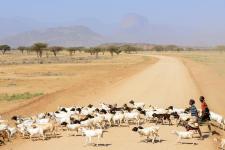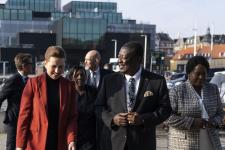Towards a just green transition

The importance of governance for a just green transition
In global debates about the green transition, much attention is directed towards finance, and especially how we can source more of it. Other debates evolve around technology and practical solutions. These issues are obviously crucial, but a third fundamental issue gets much less attention in the green transition, namely that of governance. This is problematic because (i) governance is key to ensuring that green finance and practical solutions support a just and equitable transition; and (ii) without collective action and popular legitimacy, many green policies and interventions simply will not be effective or sustainable over time. The governance challenge cuts across multiple issues in the green transition, including climate change mitigation and carbon markets, climate change adaptation, biodiversity conservation, and mining for green tech minerals. Governance is a critical but under-addressed issue in all these fields.
Here the focus is on one emerging and particularly contested issue in the African context, namely the governance of investments in forest and land-based carbon schemes and large-scale renewable energy projects.
African ambitions: A hub for green investments
A number of African governments increasingly position themselves as active contributors to not only the African but also the global green transition. This was highlighted in the 2023 Nairobi Declaration which – although not backed by all African leaders - constituted a significant attempt to rewrite the narrative on African countries as being only passive victims of climate change. The hope is to situate Africa as a future hub for carbon markets, major green investments and multilateral finance, including a focus on forest- and land-based emission reductions and large-scale renewable energy schemes, with associated carbon offset trading. The Africa Carbon Markets Initiative is one example. Opportunities for linking debt-relief to climate finance are also being sought, including approaches such as Gabon’s recent USD 500 million “debt-for-nature” swap.'
“Africa possesses both the potential and the ambition to be a vital component of the global solution to climate change. As home to the world’s youngest and fastest-growing workforce, coupled with massive untapped renewable energy potential, abundant natural assets and an entrepreneurial spirit, our continent has the fundamentals to spearhead a climate compatible pathway as a thriving, cost-competitive industrial hub with the capacity to support other regions in achieving their net zero ambitions.”
“Africa’s vast forests, especially the Congo Basin rainforest are the largest carbon sinks globally, and with the important ecosystem services provided by Africa’s vast savannahs, Miombo woodlands, peatlands, mangroves, and coral reefs, it is time that Africa’s natural capital wealth is properly measured by recognizing its contribution to reducing global carbon emissions.”
The developing land squeeze
A cross-cutting feature in these aims is that they require considerable expanses of land, water and other natural resources, and are subject to increasing contestation and resistance. The current combined pledges under the Paris Climate Agreement assume that approximately 1.2 billion hectares of land is made available globally for carbon dioxide removal interventions. This is equivalent to some 2/3rds of the world’s arable land. Much of this depends on forest- and land protection and -restoration in the Global South, including Africa. Investments in these schemes are still developing, but there is renewed momentum for especially forest-and land-based carbon schemes, with advances made at recent COPs and expansion of the scope from forests to grasslands, wetlands etc. As an example, the UAE-based investment company Blue Carbon have recently entered into individual agreements with 5 African countries for land-and forest-based carbon removal and offsetting projects. The agreements cover more than 24 million hectares and amount to very significant shares of these countries’ land mass. For example, activities under the agreement with Zimbabwe encompass almost 20% of that country, in an MoU valued at USD 1.5 billion USD.
Wind and solar projects also require land, as do biofuel schemes, while African exports of critical minerals for green tech has increased significantly. Meanwhile the important need to address global biodiversity decline also requires conservation of significant additional land areas across Africa and is increasingly linked to climate action through multi-purpose Nature-based Solutions. The land- and resource requirements of the green transition thereby add substantially to an already developing global land- and natural resource “squeeze” which threatens African (and global) development- and climate goals.
The risks for people and green outcomes
A key feature of the green transition’s requirements in the African context is that they target land and resources that are already in use by ordinary citizens for their livelihoods. This has led to growing resistance from citizens and civil society organisations towards such schemes, and Human Rights advocates have expressed concerns about draconian measures and “green grabbing” of land areas from communities. In some countries, competing elites are furthermore politicizing green interventions for personal or political gain. Many green projects do seek inclusive approaches, e.g. restoring and conserving land and forests collaboratively with small-scale farmers. But historically such projects have suffered from a lack of appropriate governance frameworks and have often failed to achieve broad legitimacy and de facto development benefits for the involved communities, as evident in decades of African nature conservation and experience from African REDD+ pilot schemes. As a result, many projects have become divisive efforts and a source of conflict themselves. The lack of popular support furthermore threatens the ability to deliver on climate ambitions: Without local legitimacy, forest- and land-based carbon schemes have had great difficulty in meeting their emission reduction objectives, while protests over renewable energy schemes have led to delays or even cancellation of some such projects.
The need to strengthen governance in carbon schemes
Given the geographical scale of these investments and the hopes attached to them in terms of global climate change mitigation and development, there is need for a concerted collaborative effort to strengthen their governance in ways that support a just green transition in African countries. This includes:
- Strengthening global and domestic standards and regulations to ensure that investments provide real measurable benefits and rights to citizens and do not lead to disenfranchisement.
- Supporting inclusive national dialogues and public deliberation on the big policy questions: What kind of climate change mitigation do we want here, and how can it address people’s needs?
- Enhancing frameworks for inclusive decision-making and planning for investments in land- and forest-based carbon schemes and renewable energy projects. After-the-fact consultations are not enough.
- Facilitating collective action around bottom-up developed mitigation projects through “whole of society” approaches that link civil society, public and private actors.
- Strengthening public grievance and ombudsman facilities and conflict resolution mechanisms
- Sharing and enacting methods for co-produced (participatory) monitoring, evaluation and verification methods that enhance public transparency and accountability of projects and their outcomes (existing international verification schemes are mainly technical and not domestically anchored).
In contexts of high conflict fragility and extreme authoritarian rule, some of these options may not be viable, but efforts to support civil society and bottom-up approaches may be possible.
Denmark’s role
As a self-acclaimed frontrunner in global climate financing for the benefit of the poor and vulnerable Denmark is well positioned - and obligated - to play a leveraging role in this respect. A number of Denmark’s multilateral and bilateral financial commitments address forest and nature-issues related to climate change and emission reductions, including the new special effort on Forests & Nature for which some DKK 1 billion are planned in the 2024 Finanslov over the 2024-2027 period – potentially including support to the Central African Forest Initiative (the world’s second largest rainforest) and East African countries. Likewise, Denmark has a longstanding interest and world leading role in the wind sector, and substantial financial commitments to supporting renewable energy in the South. Denmark’s commitment to human rights-based approaches and UN declarations on e.g. Free, Prior, and Informed Consent (FPIC) further highlights the need – and potential - for Denmark to support the governance issue in the green transition.
With a pragmatic and partnership-oriented approach to Denmark’s role in Africa, dilemmas inevitably present themselves: Governance issues can be sensitive and dealing with complex governance issues may seem irrelevant at a time of environmental emergency. But governance has always been a sensitive aspect of bilateral relations and should not lead to abandoning the issue. Moreover, with poor governance and lack of popular legitimacy, environmental goals simply will not be achieved and sustained over time. Options for Denmark to pursue include:
Promoting collaborative action on carbon investment governance
- Expanding the “just transition” agenda to address governance and livelihood issues more broadly. Originally this agenda evolved mainly around transforming jobs, and still does in much of the Danish agenda and support. But in African and other international debates the concept is taking on a broader meaning and provides opportunities for fostering multi-stakeholder engagement and co-production on governance frameworks for carbon governance.
- Teaming up with selected African countries to highlight and take a lead on the issue in the global climate alliances and multilateral climate funds where Denmark is well positioned, as well as in the NDC partnership and in UNFCCC talks regarding carbon trading regulations and criteria.
- Engaging and supporting Pan-African grassroots alliances and civil society organisations to raise debate, awareness and exchange experiences on governance of carbon projects.
- Promoting de facto adoption of existing international standards for carbon investments/projects that emphasize governance issues. E.g. the IUCN global standard for Nature-based Solutions.
Facilitating sharing of experiences
- Facilitating South-South sharing of experiences on the governance of carbon finance investments. E.g. experiences from large-scale REDD+ efforts under the Amazon Fund, the Central African Forest Initiative, the Forest Carbon Partnership and similar activities in Asia etc.
- Creating synergies and learning from parallel developments in the climate change adaptation agenda, e.g. the Locally Led Adaptation (LLA) principles that Denmark have committed to and are supporting through e.g. the LOCAL programmes in various African countries.
- Aligning with the multilateral banks on the issue, e.g. recent DIIS interviews at the World Bank suggest carbon market governance has been identified as a developing issue there.
Bilateral partnerships
- Bilateral learning partnerships could provide insights both ways. The challenge of ensuring popular benefits and legitimacy in the green transition is a global issue, also in e.g. Denmark where opposition to renewable energy projects threaten Danish roll-out of renewables.
- Denmark’s current Strategic Sector Cooperation efforts mainly focus on technical aspects. Yet Denmark has traditions and expertise in governance – e.g. municipal planning processes - that could be of interest to African countries and applied in the Strategic Sector Cooperation efforts.
DIIS Experts


